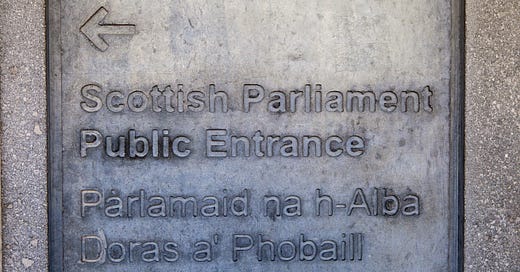Lisa Mackenzie, of MurrayBlackburnMackenzie, the policy analysis collective which leads on independent research into sex-based rights and the impact of gender self ID in Scotland, spoke at the For Women Scotland rally at the Scottish Parliament on Thursday 2 September. Here’s her speech.
My name is Lisa Mackenzie and for the last three years, along with my two colleagues Kath Murray and Lucy Hunter Blackburn, I have been researching the way in which many Scottish and UK public authorities have lost sight of women’s rights in policy and law-making.
Specifically, how they have failed to take account of sex as a protected characteristic in the 2010 Equality Act.
Let me give you some examples.
Failure to guarantee single sex facilities
Three years ago, one of the largest NHS boards in Scotland admitted that it can’t guarantee a female healthcare practitioner to women who request one. And many NHS boards and trusts throughout the UK have policies in place which mean that hospital wards are no longer single sex.
The Scottish Government recently published guidance for schools which fails to guarantee that female pupils will have access to single sex facilities.
The Scottish Prison Service introduced a policy in 2014 which allows male prisoners to be accommodated in the female prison estate.
Police Scotland have changed how they record crime. It is now possible that a rape or an alleged rape – an indisputably male crime – could be recorded as a female crime.
At the end of last year, the Scottish Government’s Chief Statistician issued draft guidance which would see the cessation of the collection of data on sex, in all but a few exceptional circumstances.
I don’t think I need to tell those of you here today why this matters. The question is why is it happening?
Failure of leadership
It’s happening because public servants – the people whose day job it is to create policies and laws on behalf of everyone – are failing to take account of the needs and interests of women.
It’s happening because these individuals are failing to recognise this conflict of rights, let alone seek resolutions to that conflict.
It’s happening because of a wider failure of political leadership.
With a few honourable exceptions, the people we have elected to represent us have failed to step up to the plate, to enable a proper debate in our council chambers, in our parliaments and our other civic institutions.
During the recent election campaign, aspiring members of the Scottish Parliament – when asked about this issue – were quick to record their concern about how damaging and toxic this debate has become.
But most were slow to commit to creating the time and space for these issues to be debated soberly and thoughtfully.
And all the while, people are being harmed. Because everyone is harmed when we try to suppress a debate which has implications for all of us.
Women’s voices are not being heard, let alone listened to, in the building behind us and the building further up the Royal Mile and the building 400 miles from here.
In her recent book, How To Stay Sane In An Age Of Division, the Turkish writer Elif Shafak writes:
“Not to be able to tell your story, to be silenced and shut out, is to be dehumanised. It strikes at your very existence; it makes you question your sanity, the validity of your version of events. It creates a profound existential anxiety in us.”
So please keep using your voice. Seek out the people who we elect to represent us in our debating chambers. Email them, call them, meet them.
Women demand their rights
Let them know that our demands are reasonable:
The right to be able to request a female healthcare practitioner or carer or counsellor in the moments when we are at our most vulnerable.
The right of women and girls to have access to single sex spaces, whether that’s a school changing room, hospital ward, youth hostel dormitory or prison.
The right to mechanisms which take account of the barriers women face in trying to play a full part in public life: all women shortlists, reserved places for women on public boards, sex segregated sports.
Most of these rights exist on paper and in law. But they are frequently misinterpreted, or simply not applied in practice.
These rights were hard won. And the only choice is to continue to assert and demand them.
Women won’t wheesht. And nor should we.





Unbelievable that our hard fought for rights are endangered - most women I know need educating themselves!
Great speech!